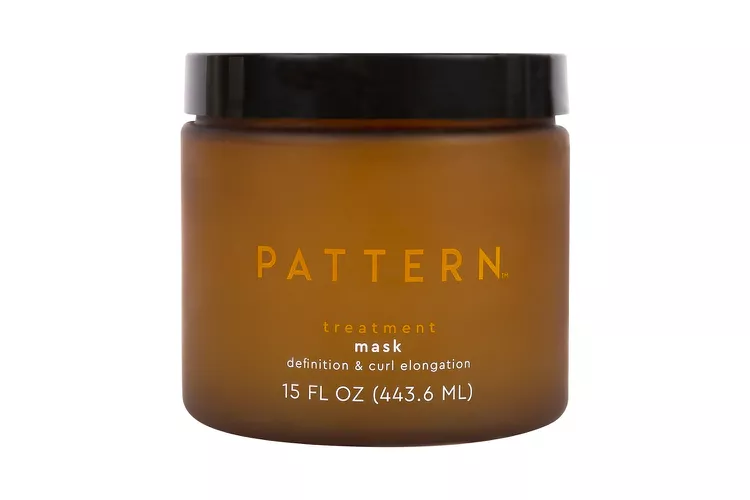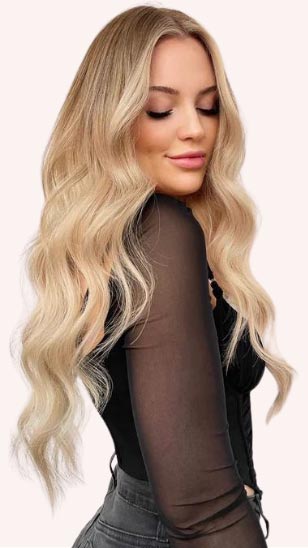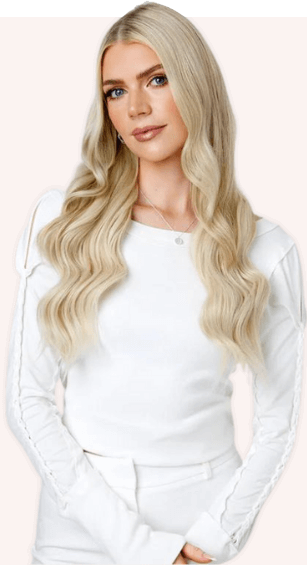If you’re looking to take your hair care routine to the next level, incorporating a hair mask might be just the thing you need. They are intensive treatments designed to nourish, hydrate, and repair your hair. They can help to improve the overall health and appearance of your hair, leaving it looking and feeling soft, shiny, and healthy. But with so many different types of masks on the market, it can be difficult to know where to start.
In this blog post, we’ll take a deep dive into everything you need to know about using a hair mask, including the benefits of using one, how to choose the right hair mask for your hair type, and tips for getting the most out of your hair mask treatment. Whether you’re a hair care novice or a seasoned pro, this post will provide you with all the information you need to get started with using a hair mask and achieving the best results possible.
I. About Hair Mask
You’ve probably heard of or perhaps tried, a face mask. Just as a face mask works to nourish and hydrate your skin, a hair mask works in a similar way to boost the condition and health of your hair.
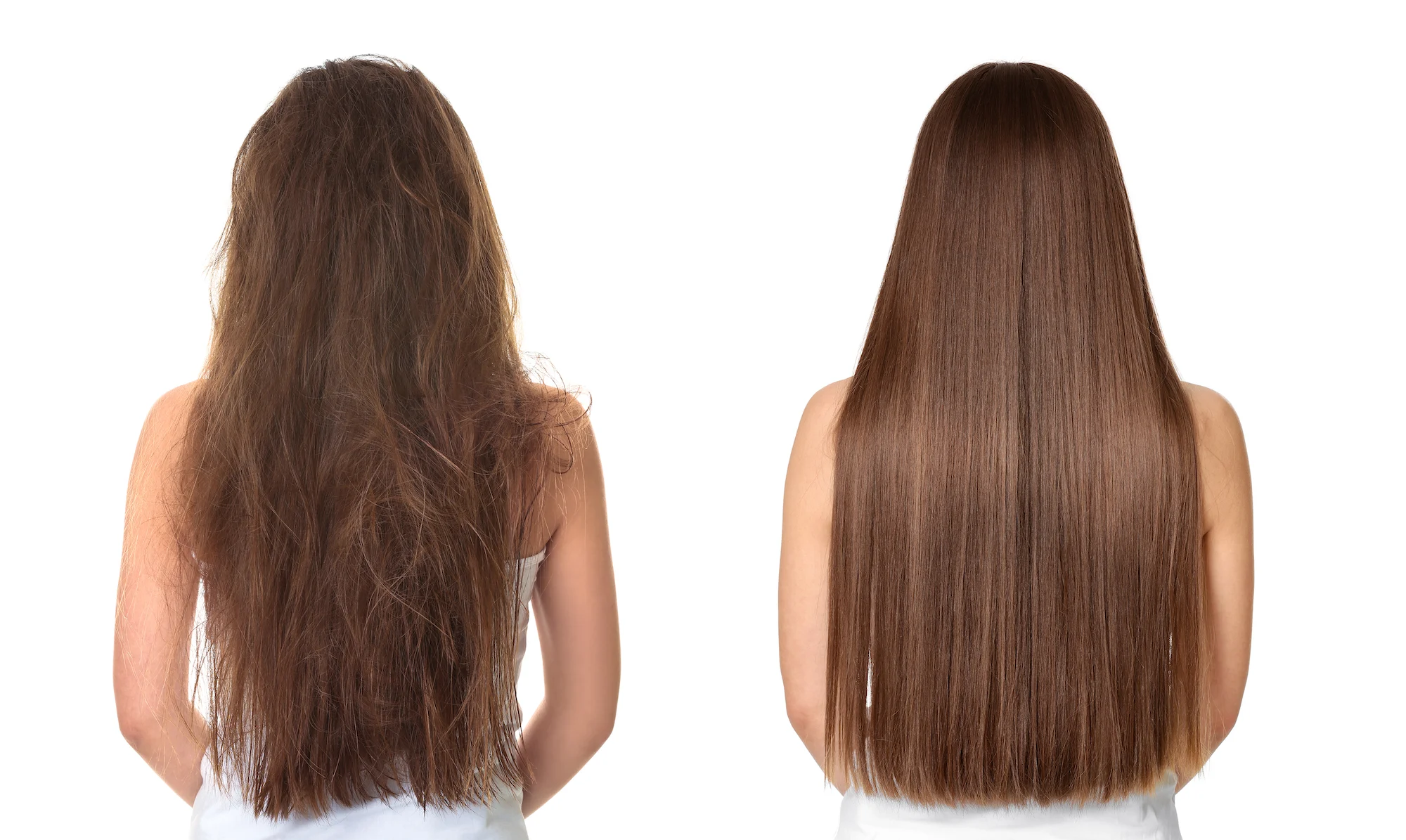
Hair masks may also be referred to as deep conditioning treatments or intensive hair conditioners. They are quick yet highly potent, effective ways to provide your hair with tons of health benefits. What makes them different from instant conditioners is that the ingredients are usually more concentrated, and the mask is left on your hair for longer – anywhere from 20 minutes to several hours. It would not be an exaggeration to say that hair masks are key to healthy hair, no matter the hair texture.
Many types of hair masks can be made at home from ingredients you may already have in your kitchen, like bananas, honey, or even egg yolk. Or, if you don’t want to fuss with making one yourself, there are many types of pre-made hair masks you can buy at the store.
Read Now: 7 Best DIY Hair Masks To Try At Home
II. What Are The Benefits of A Hair Mask?
Hair masks offer a wide range of benefits for your hair, depending on the type of mask you use and its ingredients. Here are some of the most common benefits of using a hair mask:
- Deep conditioning: Hair masks are designed to penetrate deep into the hair shaft to provide intense hydration and nourishment. This helps to restore the hair’s natural moisture balance, making it softer, smoother, and more manageable.
- Repair damaged hair: It can help repair damaged hair by providing essential nutrients that help to strengthen the hair and reduce breakage. This is particularly important if you frequently style your hair with heat tools or chemical treatments.
- Enhance shine: Many masks contain ingredients like oils and proteins that can help to enhance the natural shine of your hair, leaving it looking healthy and radiant.
- Reduce frizz: Frizzy hair can be a real challenge to manage, but using a mask can help to reduce frizz and make your hair more manageable. This is because it can help to smooth the hair cuticle, which reduces frizz and makes your hair easier to style.
III. How To Apply A Hair Mask?
Most hair masks work best when applied to clean, towel-dried hair that’s still damp. However, if you’re using a mask made primarily of oil, like coconut oil or rosemary oil, it may be best to apply to dry hair. Because oil can repel water, some hair care experts believe that dry hair is able to absorb oil better than wet hair.
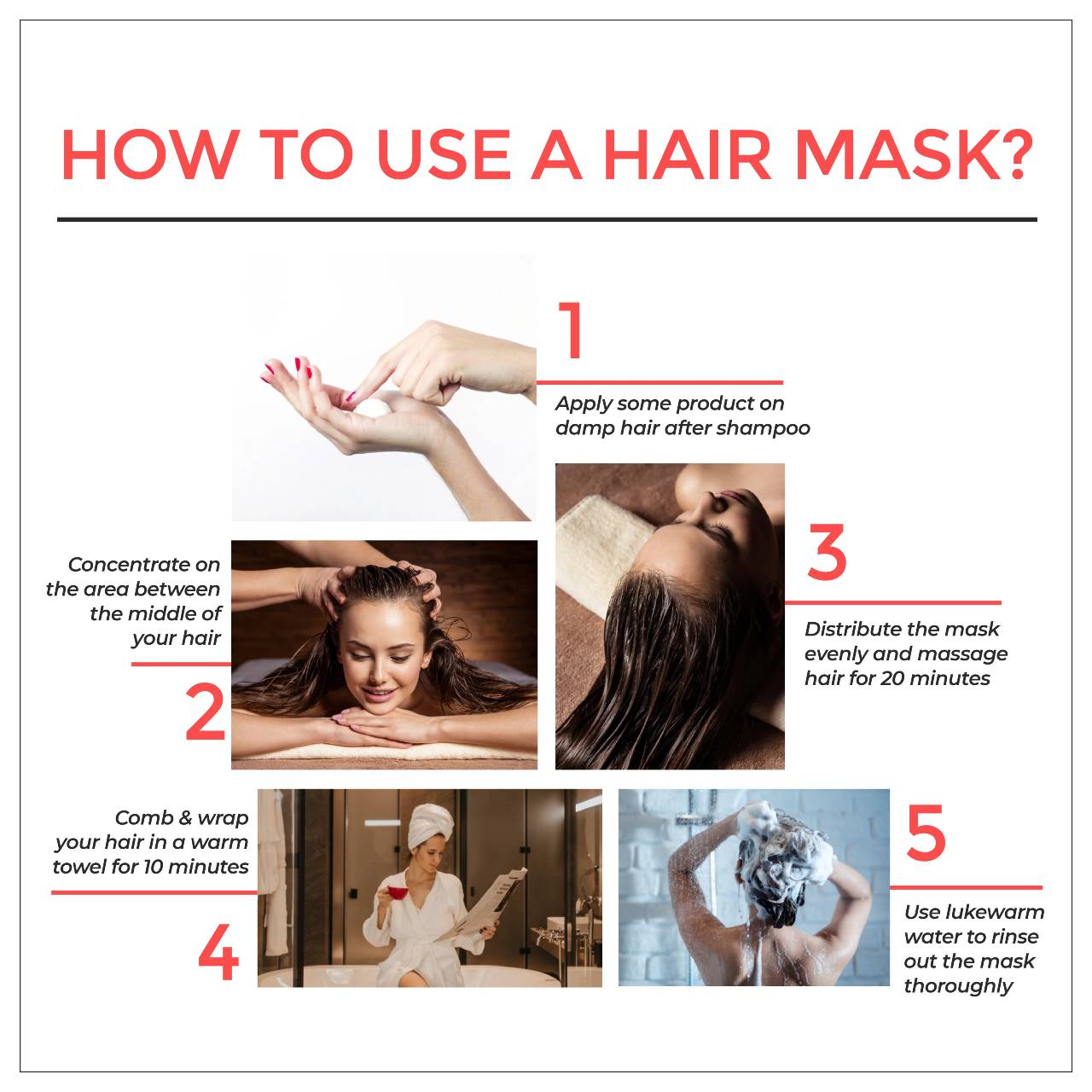
- If your hair is long or thick, it may help to divide it into sections with hair clips. You can apply the mask with your fingers, or you can use a small paintbrush to dab the hair mask mixture onto your hair.
- Once you’re done applying the mask, run a wide-tooth comb through your hair to help ensure the mask is evenly spread.
- Cover your hair with a shower cap or plastic wrap. Then wrap a towel around your head. This helps protect the mask from dripping, but it also helps add some heat, which can help the ingredients absorb into your hair.
- Leave the mask on for at least 20 to 30 minutes. Depending on the ingredients, some masks can be left on for hours or even overnight.
- Rinse thoroughly with lukewarm or cool water. Avoid hot water. Cooler water can help seal the hair cuticle and help your hair retain more moisture. After rinsing out the mask, you can add products and air-dry or heat-style your hair as usual.
*Note*
- If your hair is dry, begin the application near your scalp and work toward the ends. Once the mask has been worked into the ends of your hair, you can go back and gently apply it to your scalp.
- If you’re specifically applying the mask to treat dandruff, you’ll want to start at your scalp.
- If your hair is oily, begin the hair mask application at mid-shaft and work toward the ends.
→ For dry, frizzy, or damaged hair, you can apply it once a week. If your hair tends to be oilier, try using one every couple of weeks.
IV. Top Best Hair Mask To Purchase 2023
These days, masks can do everything from adding moisture and shine to fighting frizz and undoing the damage. The secret to choosing the right one for you? Pinpoint your “problem” and focus on finding a solution. There are plenty of options available, so to take the guesswork out of selecting the right one for you, we handpicked the most popular options and tested them out at home. Only the highest-rated products made the list. Let’s see!
1. For Damaged Hair: Olaplex No. 8 Bond Intense Moisture Mask
Olaplex No. 8 Bond Intense Moisture Mask touts a proprietary technology that repairs the disulfide bonds that are broken when hair is colored or chemically treated, helping it stay stronger and healthier for longer. The intensive treatment also works wonders on split ends and tangles, reducing the number of knots and shedding.
2. For Dry Hair: Christophe Robin Regenerating Mask with Prickly Pear Oil
This intensive mask from Christophe Robin boasts a creamy formula that features prickly pear seed oil, an ingredient known to add shine, volume, and life to dull, brittle strands. The mask doesn’t have to be left in for a long time (a few minutes will do), so it’s a great choice for those that are short on time or patience. After consistent use, it softens, nourishes, and breathes life back into brittle hair.
3. For Curly Hair: Pattern Treatment Mask
Curly hair comes with its own unique set of needs, so it’s imperative to choose a hair mask that is specifically made for your texture. Along with strengthening and softening, this mask from Tracee Ellis Ross’s brand Pattern offers tons of benefits, namely elongating and defining curls, kinks, and coils. It’s a great detangler, too, which helps make hair more manageable and easy to comb fingers through.
4. For Treated Hair: Davines Nounou Hair Mask
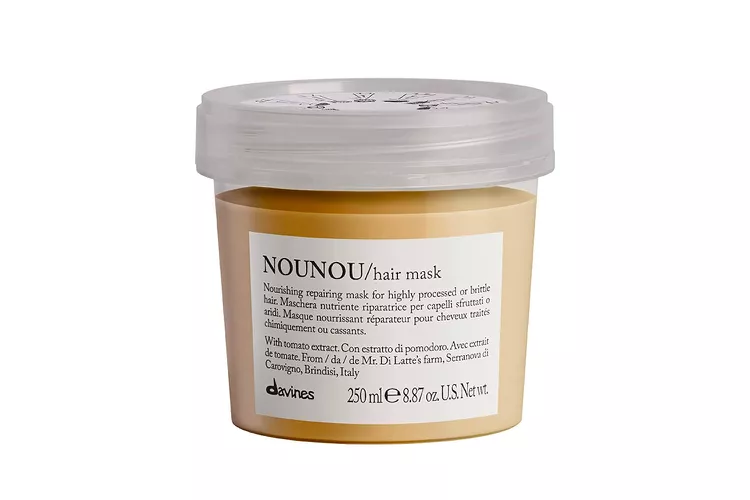
This product from Davines is ideal, helping to repair bleached, permed, or relaxed hair. It restores hydration and the body with the help of antioxidant-rich Fiaschetto tomato extract from Italy and vitamin E while also invigorating the scalp and keeping it free from irritation. The result: Silky smooth strands. Our only bone to pick with this one is that it contains dimethicone, which is a non-soluble form of silicone that can lead to build-up.
5. For Fine Hair: Sachajuan Hair Repair
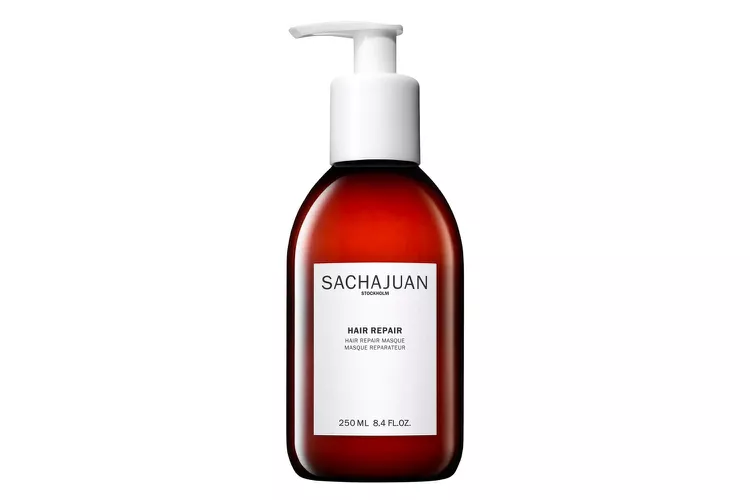
Choosing a mask when you have fine hair can prove to be a bit of a conundrum, given that the moisturizing nature makes most options heavy and more likely to weigh down your hair. But this one is an exception – it’s actually super lightweight. Those with super-thin, dry hair will appreciate that the formula makes a noticeable difference in the appearance of tangles and frizz, even after heat styling and going a few days between washes. Best of all, it never weighs hair down and requires you to wash more frequently than normal.
V. Conclusion
Hair masks can help moisturize and nourish your hair. They’re especially beneficial for dry, damaged, or frizzy hair. Some hair masks may even improve the health of your scalp and boost the strength of your hair. There are many different types of DIY hair masks you can make at home using natural ingredients like coconut oil, eggs, honey, or bananas. If you buy a ready-made mask, look for one that’s well-suited to your hair type and contains as few preservatives and chemicals as possible.


 BEST SELLING PRODUCTS
BEST SELLING PRODUCTS Wig Hair
Wig Hair WHOLESALE
WHOLESALE Contact us
Contact us Sale Events
Sale Events

